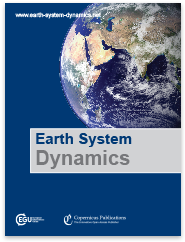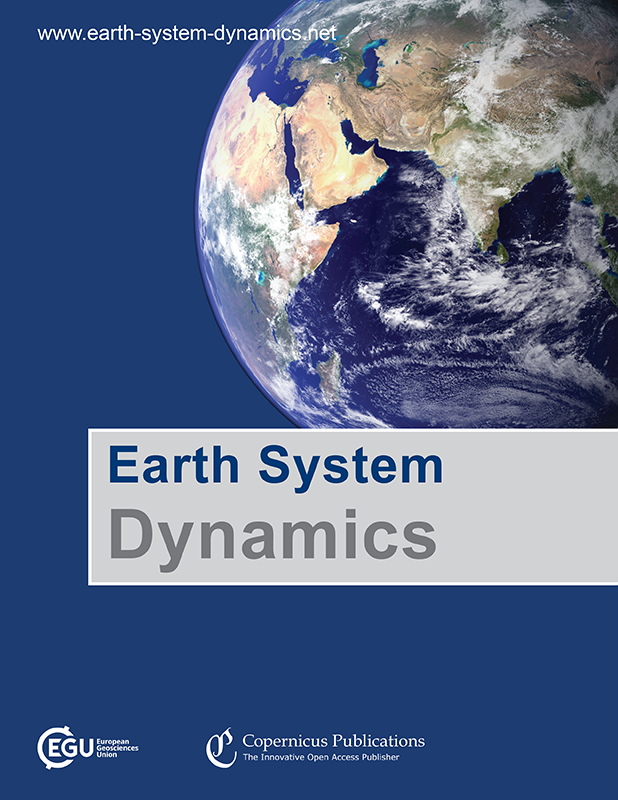Chief editors: Ira Didenkulova, Axel Kleidon & Gabriele Messori
eISSN: ESD 2190-4987, ESDD 2190-4995
Earth System Dynamics (ESD) is a not-for-profit international scientific journal dedicated to the publication and public discussion of studies that take an interdisciplinary perspective on the functioning of the Earth system and global change. The overall behaviour of the Earth system is strongly shaped by the interactions among its various component systems, such as the atmosphere, cryosphere, hydrosphere, oceans, pedosphere, and the lithosphere, but also by life and increasingly by human activity. ESD solicits contributions that investigate these various interactions and the underlying mechanisms, ways how these can be conceptualized, modelled, and quantified, predictions of the overall system behaviour to global changes, and the impacts for its habitability, humanity, and the future functioning of the Earth system in the Anthropocene.
Journal metrics
ESD is indexed in the Web of Science, Scopus, Google Scholar, etc. We refrain from displaying the journal metrics prominently on the landing page since citation metrics used in isolation do not describe importance, impact, or quality of a journal. However, these metrics can be found on the journal metrics page.
Highlight articles
03 Feb 2026
The largest crop production shocks: magnitude, causes and frequency
Florian Ulrich Jehn, James Mulhall, Simon Blouin, Łukasz G. Gajewski, and Nico Wunderling
Earth Syst. Dynam., 17, 151–166, https://doi.org/10.5194/esd-17-151-2026,https://doi.org/10.5194/esd-17-151-2026, 2026
Short summary
22 Dec 2025
Bridging science and practice on multi-hazard risk drivers: stakeholder insights from five pilot studies in Europe
Nicole van Maanen, Marleen de Ruiter, Wiebke Jäger, Veronica Casartelli, Roxana Ciurean, Noemi Padrón-Fumero, Anne Sophie Daloz, David Geurts, Stefania Gottardo, Stefan Hochrainer-Stigler, Abel López Diez, Jaime Díaz Pacheco, Pedro Dorta Antequera, Tamara Febles Arévalo, Sara García González, Raúl Hernández-Martín, Carmen Alvarez-Albelo, Juan José Diaz-Hernandez, Lin Ma, Letizia Monteleone, Karina Reiter, Tristian Stolte, Robert Šakić Trogrlić, Silvia Torresan, Sharon Tatman, David Romero Manrique de Lara, Yeray Hernández González, and Philip J. Ward
Earth Syst. Dynam., 16, 2295–2311, https://doi.org/10.5194/esd-16-2295-2025,https://doi.org/10.5194/esd-16-2295-2025, 2025
Short summary

20 Nov 2025
Conditions for instability in the climate–carbon cycle system
Joseph Clarke, Chris Huntingford, Paul D. L. Ritchie, Rebecca Varney, Mark S. Williamson, and Peter Cox
Earth Syst. Dynam., 16, 2087–2100, https://doi.org/10.5194/esd-16-2087-2025,https://doi.org/10.5194/esd-16-2087-2025, 2025
Short summary
16 Oct 2025
AR6 updates to RF by GHGs and aerosols lowers the probability of accomplishing the Paris Agreement compared to AR5 formulations
Endre Z. Farago, Laura A. McBride, Austin P. Hope, Timothy P. Canty, Brian F. Bennett, and Ross J. Salawitch
Earth Syst. Dynam., 16, 1739–1758, https://doi.org/10.5194/esd-16-1739-2025,https://doi.org/10.5194/esd-16-1739-2025, 2025
Short summary
More highlight articles  All EGU highlight articles
All EGU highlight articles 
11 Feb 2026
An Information-Based World-Earth System Resilience Index
John M. Anderies, Max Bechthold, Jonathan F. Donges, Ingo Fetzer, Nico Wunderling, Wolfram Barfuss, and Johan Rockström
EGUsphere, https://doi.org/10.5194/egusphere-2025-6345,https://doi.org/10.5194/egusphere-2025-6345, 2026
Preprint under review for ESD (discussion: open, 0 comments)
Short summary
04 Feb 2026
Extreme events in the Amazon after deforestation
Arim Yoon, Cathy Hohenegger, Jiawei Bao, and Lukas Brunner
Earth Syst. Dynam., 17, 167–179, https://doi.org/10.5194/esd-17-167-2026,https://doi.org/10.5194/esd-17-167-2026, 2026
Short summary
News
03 Dec 2025
New MS Word template available for manuscript preparation
The existing MS Word template for authors has been significantly expanded and now includes many important notes on the standard sections that must be included in the manuscript. Please visit the "Submission" page, section "Templates for your manuscript file" and download the new template before writing your next manuscript. 
03 Dec 2025
New MS Word template available for manuscript preparation
The existing MS Word template for authors has been significantly expanded and now includes many important notes on the standard sections that must be included in the manuscript. Please visit the "Submission" page, section "Templates for your manuscript file" and download the new template before writing your next manuscript. 
02 Oct 2025
Press Release: Antarctic Sea ice emerges as key predictor of accelerated ocean warming
A groundbreaking study published today in ESD provides a critical and previously underestimated connection between Antarctic sea ice, cloud cover, and global warming. This research is important because it shows that a greater extent of Antarctic sea ice today, compared to climate model predictions, means we can expect more significant global warming in the coming decades. Please read more. 
02 Oct 2025
Press Release: Antarctic Sea ice emerges as key predictor of accelerated ocean warming
A groundbreaking study published today in ESD provides a critical and previously underestimated connection between Antarctic sea ice, cloud cover, and global warming. This research is important because it shows that a greater extent of Antarctic sea ice today, compared to climate model predictions, means we can expect more significant global warming in the coming decades. Please read more. 
Notice on the current situation in Ukraine
To show our support for Ukraine, all fees for papers from authors (first or corresponding authors) affiliated to Ukrainian institutions are automatically waived, regardless if these papers are co-authored by scientists affiliated to Russian and/or Belarusian institutions. The only exception will be if the corresponding author or first contact (contractual partner of Copernicus) are from a Russian and/or Belarusian institution, in that case the APCs are not waived.
In accordance with current European restrictions, Copernicus Publications does not step into business relations with and issue APC-invoices (articles processing charges) to Russian and Belarusian institutions. The peer-review process and scientific exchange of our journals including preprint posting is not affected. However, these restrictions require that the first contact (contractual partner of Copernicus) has an affiliation and invoice address outside Russia or Belarus.





